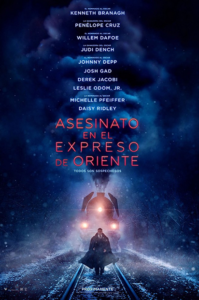
 “Murder on the Orient Express” is an old-fashioned cinematic experience. Director Kenneth Branagh breaks no ground with this quaint retelling of the popular Agatha Christie who-done-it. The cast is fun, but the mystery is kind of flat. By the third act, as the humor is drained and the self-important exposition becomes exhausting, you just want them to get on with solving the riddle.
“Murder on the Orient Express” is an old-fashioned cinematic experience. Director Kenneth Branagh breaks no ground with this quaint retelling of the popular Agatha Christie who-done-it. The cast is fun, but the mystery is kind of flat. By the third act, as the humor is drained and the self-important exposition becomes exhausting, you just want them to get on with solving the riddle.
After bringing a thief to justice in colorful fashion, famed detective Hercule Poirot (Branagh) is called away on a new assignment. To get to his destination, he boards the Orient Express. This marvelously lavish passenger train cuts its way through cold terrain with an eclectic cast of characters on board. When one of them is murdered, Poirot’s laid back sojourn turns into a working vacation.
The key attraction here is the ensemble casting. Johnny Depp plays a disreputable gangster type; Penélope Cruz is a pious nurse of some sort; Judi Dench a difficult Princess; Willem Dafoe is a racist Austrian professor; Daisy Ridley plays a governess; and Michelle Pfeiffer is an aging socialite. Naturally, everyone is hiding something. And when the murder is discovered, unraveling those secrets falls on Poirot’s mustachioed shoulders.
Perhaps the greatest effect in the film is Poirot’s amazing mustache. It is gravity defying. Extending from immediately below his nose, the hair growth perfectly curls upward uniformly on either side. But it is, also, flanked by cheek hair located below the curls running nearly the length of his jaw. Studying this phenomenal bit of manscaping is part of the charm of “Murder on the Orient Express.” And, yes, there is a scene where Poirot awakes with his mustache protected by a housing of some sort strapped around his head. This is a bit of whimsy fun.
The cast is irresistible. In addition to the names referenced above, we get Derek Jacobi as Depp’s character’s manservant and Josh Gad as his alcoholic book-keeper. Leslie Odom, Jr., plays a key role as a conflicted doctor. The attractive talent is over-flowing. But the central mystery is just not there. This collection of wonderful actors deserved better.
The film sure looks good. Shot by Haris Zambarloukos, who worked with Branagh on 2011’s “Thor” and 2015’s “Cinderella,” the 70mm film format is used fantastically. But the set design is maybe too grounded. The train is an exciting character all by itself. But as the narrative shifts more and more to the characters and the mystery, the train is left with little attention.
For example, one part of the mystery is how the killer makes his or her way through the train without being detected. Instead of properly acquainting us with the layout of the train, we see it in glimpses almost as though we are a passenger. This visual scope during key parts of the investigation is frustrating, because I wanted to investigate myself in hopes of catching a clue possibly missed.
And this leads to the problem here, no clue is left for the viewer to discover, rather, Poirot explains it all and we only see the clues from his vantage point. Sure, this is all intentional, however, it is inconsistent. In one scene, the body is talked about but not shown until much later. The camera switches to a bird’s eye view of the train hallway, as Poirot enters the cabin of the deceased and observes the body. Therefore, instead of being a part of the investigation in that scene we are shut out of it. I’m not sure what the motivation was for this inconsistency. This is especially true as we are permitted more intimate shots unrelated to the mystery by peering into Poirot’s cabin and seeing him pine away before his lost love’s photo. The visual scope is somewhat at odds with the narrative focus.
In speaking about the film with my wife after the screening, she asked what it might have been like had Wes Anderson directed it. That’s a very good thought. Clearly, Anderson would have given us some excellent visual context (think the ship in “Life Aquatic” or the hotel in “Budapest”) and the train would have been a consistent player in the story. But with Branagh at the helm, the train ultimately takes a back seat to the actors, and the film is all the worse for it.
Quibbles aside, “Murder on the Orient Express” has its charms, but none of them are enough to justify this remake. Branagh is great as Poirot, and if given another shot at the character, maybe another director should get behind the lens.
